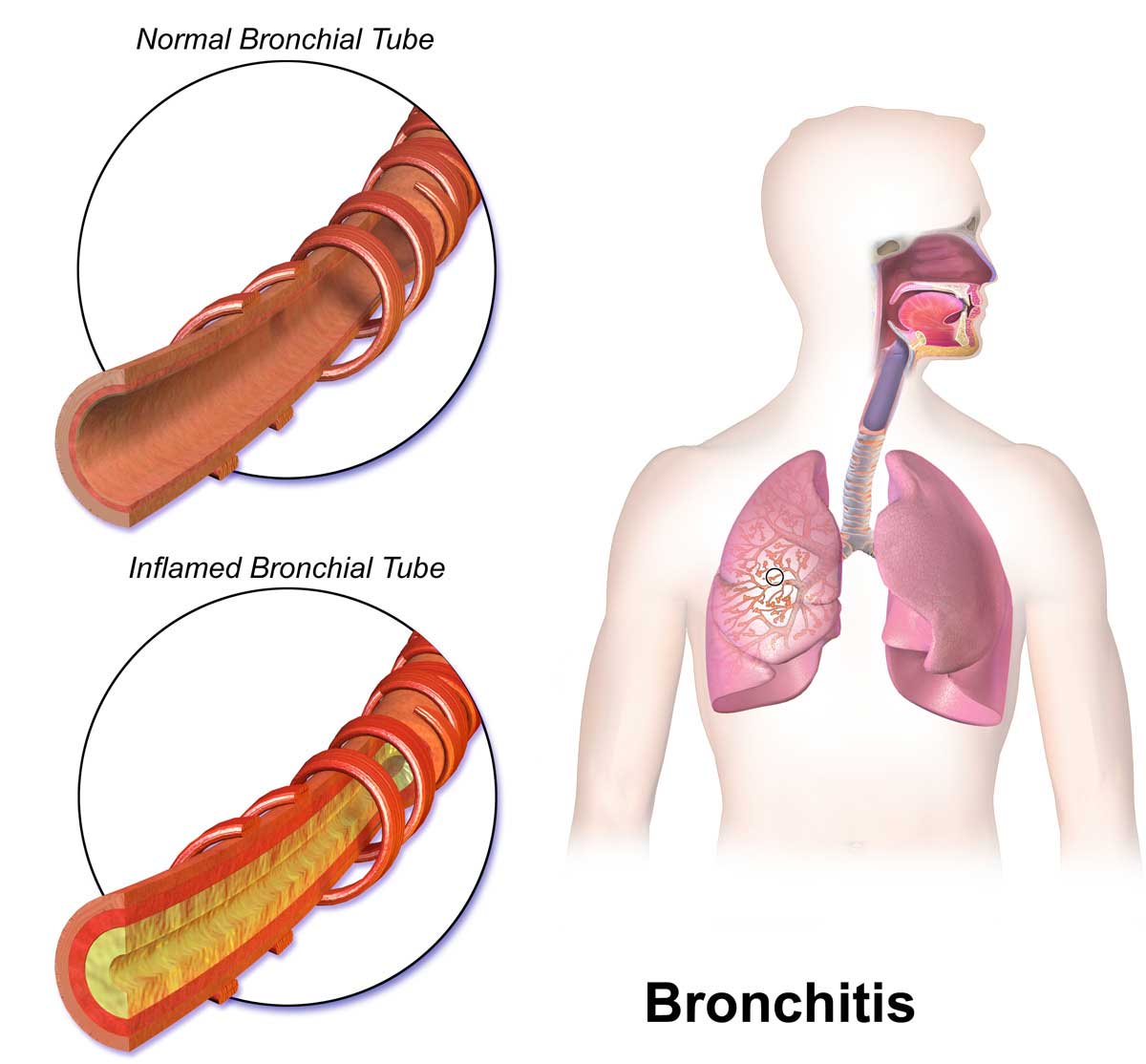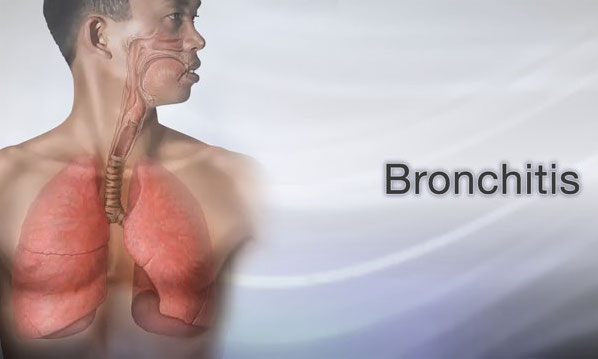WHAT IS BRONCHITIS?
Bronchitis is an inflammation (swelling) of the lining of your bronchial tubes, which carry air to and from your lungs. People who have bronchitis usually cough up thickened mucus, which could be discolored. Bronchitis can be either acute or chronic.
Usually developing from a cold or other respiratory infection, acute bronchitis is very common. Chronic bronchitis, a more severe condition, is a constant irritation or inflammation (swelling) of the lining of the bronchial tubes, usually because of smoking.
Acute bronchitis, also known as a chest cold, generally improves within a week to ten days without lasting effects, however, the cough might linger for weeks.
Although, if you have repeated bouts of bronchitis, you might have chronic bronchitis, which needs medical attention. Chronic bronchitis is one of the conditions that make up chronic obstructive pulmonary disease (COPD).
BRONCHITIS SYMPTOMS
Bronchitis is an inflammation (swelling) of the lining of your bronchial tubes, which carry air to and from your lungs. People who have bronchitis usually cough up thickened mucus, which could be discolored. Bronchitis can be either acute or chronic.
Usually developing from a cold or other respiratory infIn acute bronchitis or chronic bronchitis, signs and symptoms might include:
- Cough
- Production of mucus (sputum), which could be clear, white, yellowish-gray, or green in color unusually, might be streaked with blood
- Fatigue
- Shortness of breath
- Slight fever and chills
- Chest discomfort
If you have acute bronchitis, you may have cold symptoms, for example, a mild headache or body aches. While these symptoms often improve in about a week, you might have a nagging cough that lingers for several weeks.
Chronic bronchitis is defined as a productive cough that lasts at least 3 months, with recurring bouts happening for at least 2 consecutive years.
bouts of bronchitis, you might have chronic bronchitis, which needs medical attention. Chronic bronchitis is one of the conditions that make up chronic obstructive pulmonary disease (COPD).

WHEN SHOULD YOU SEE A DOCTOR?
See your doctor or primary care physician if your cough:
- Lasts more than 3 weeks
- Stops you from sleeping
- Is followed by a fever higher than 100.4 F (38 C)
- Produces discolored mucus
- Produces blood
- Is related to wheezing or shortness of breath
BRONCHITIS CAUSES
Acute bronchitis is generally caused by viruses, usually the same viruses that cause colds and flu (influenza). Antibiotics do not kill viruses, so this kind of medication is not useful in most cases of bronchitis.
The most frequent cause of chronic bronchitis is cigarette smoking. Air pollution and dust or toxic gases in the environment or workplace also could contribute to the condition.

BRONCHITIS RISK FACTORS
Factors that increase your chance of developing bronchitis include:
- Cigarette smoke – People who smoke or live with someone who smokes are at increased risk of both acute bronchitis and chronic bronchitis.
- Low resistance – This might result from another acute disease, such as a cold or a chronic condition that compromises your immune system. Older adults, infants, and young children have a greater susceptibility to infection.
- Exposure to irritants on the job –Your risk of developing bronchitis is greater if you work around specific lung irritants, for example, grains or textiles, or are exposed to chemical fumes.
- Gastric reflux – Repeated bouts of serious heartburn could irritate your throat and make you more susceptible to developing bronchitis.
BRONCHITIS COMPLICATIONS
However, a single episode of bronchitis generally does not cause concern, it could lead to pneumonia in some people. Repeated bouts of bronchitis, although, might mean that you have the chronic obstructive pulmonary disease (COPD).
BRONCHITIS PREVENTION
To lower your risk of bronchitis, follow these directions:
- Circumvent cigarette smoke – Cigarette smoke raises your risk of chronic bronchitis.
- Get vaccinated – Many cases of acute bronchitis originate from influenza, a virus. Getting a yearly flu vaccine could help protect you from getting the flu. You might also want to consider vaccination that protects against some types of pneumonia.
Wash your hands – To lower your risk of catching a viral infection, wash your hands frequently and get in the habit of using alcohol-based hand sanitizers. - Wear a surgical mask – If you have chronic obstructive pulmonary disease (COPD), you may consider wearing a face mask at work if you are exposed to dust or fumes, and when you are going to be among crowds, for example, while traveling.
Bronchitis

BRONCHITIS DIAGNOSIS
During the first few days of the disease, it could be hard to differentiate the signs and symptoms of bronchitis from those of a common cold. During the physical examination, your doctor or primary care physician will use a stethoscope to listen closely to your lungs as you breathe.
In some cases, your doctor or primary care physician might recommend the following tests:
- Chest X-ray – A chest X-ray could help determine if you have pneumonia or another condition that might explain your cough. This is particularly important if you ever were or currently are a smoker.
- Sputum tests – Sputum is the mucus that you cough out from your lungs. It could be tested to see if you have diseases that could be helped by antibiotics. Sputum could also be tested for signs of allergies.
- Pulmonary function test – During a pulmonary function test, you blow into a device known as a spirometer, which measures how much air your lungs could hold and how quickly you could get the air out of your lungs. This test tracks down signs of asthma or emphysema.
BRONCHITIS TREATMENT
Most cases of acute bronchitis get better without treatment, generally within a couple of weeks.
Medications
Because most cases of bronchitis are caused by viral infections, antibiotics are ineffective. Although, if your doctor or primary care physician suspects that you have a bacterial infection, he or she might prescribe an antibiotic.
In some circumstances, your doctor or primary care physician might suggest other medications, including:
- Cough medicine – If your cough keeps you from sleeping, you may try cough suppressants at bedtime.
- Other medications – If you have allergies, asthma, or chronic obstructive pulmonary disease (COPD), your doctor or primary care physician might suggest an inhaler and other medications lower inflammation and open narrowed passages in your lungs.
Therapies
If you have chronic bronchitis, you might benefit from pulmonary rehabilitation a breathing exercise program in which a respiratory therapist teaches you how to breathe more easily and increase your capacity to exercise.
If you or anyone you know is suffering from bronchitis, our expert providers at Specialty Care Clinics will take care of your health and help you recover.
Call 469-545-9983 to book an telehealth appointment for an at home check-up.
